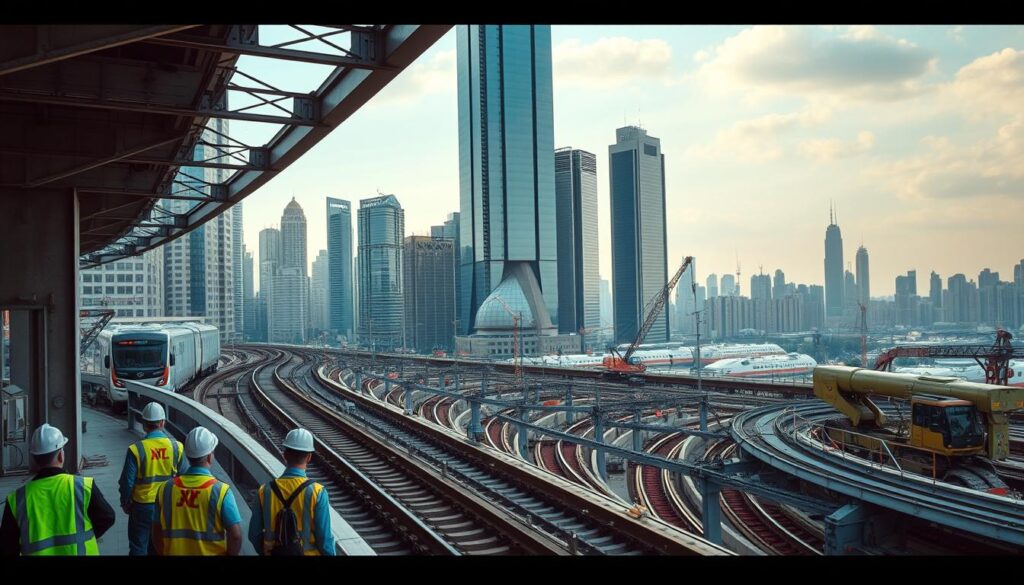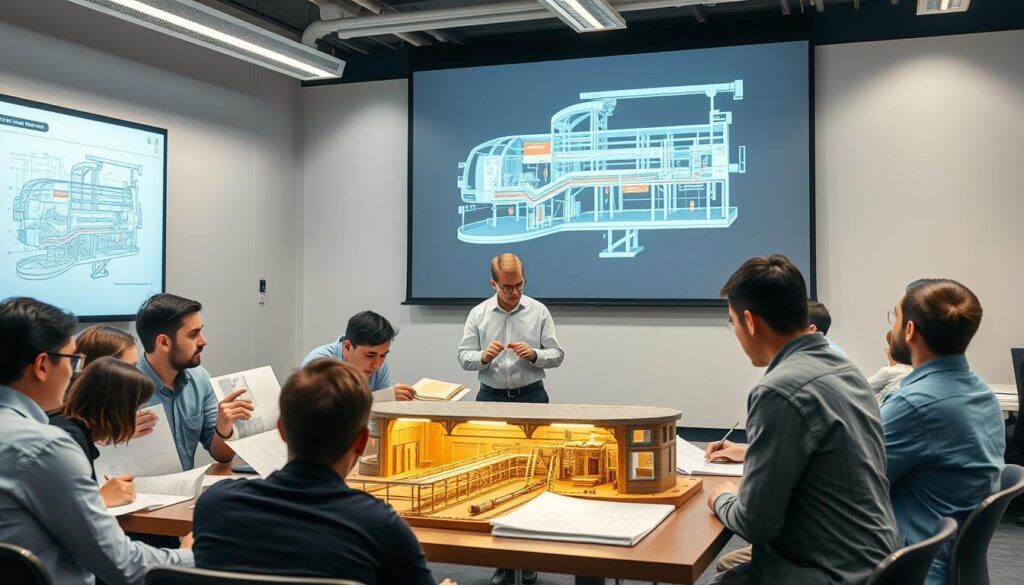Can exceptional infrastructure development be the key to unlocking your project’s full potential?
Metro Tech Engineering offers a range of professional engineering solutions that cater to the diverse needs of the Oil & Gas industry, including residential and commercial building design. By leveraging their expertise, you can elevate your project’s success and achieve outstanding results.
With a team of experts, including Rig Managers and Structural Engineers, Metro Tech Engineering provides comprehensive services that ensure efficient project execution. Their experience in creating automation and industrial tools, as well as structural engineering services, makes them an ideal partner for your next project. For more information on the importance of transportation network engineering in infrastructure development, explore the link.
Key Takeaways
- Expertise in professional engineering solutions for the Oil & Gas industry
- Comprehensive services, including residential and commercial building design
- Team of experienced professionals, including Rig Managers and Structural Engineers
- Experience in creating automation and industrial tools
- Structural engineering services for efficient project execution
What is Metro Engineering?
Metro engineering firms, like Metro Consulting Associates (MCA), have become pivotal in delivering comprehensive development consulting and advisory support. As a specialized field within civil engineering, metro engineering focuses on the planning, design, and management of urban infrastructure projects.
Definition and Scope
Metro engineering encompasses a broad range of engineering disciplines, including structural engineering, transportation planning, and environmental consulting. The scope of metro engineering is vast, covering everything from the development of public transportation systems to the construction of commercial and residential buildings.
As noted by industry experts, “The complexity of modern urban infrastructure demands a multidisciplinary approach, integrating various engineering disciplines to achieve efficient and sustainable solutions.” This approach is exemplified by firms like MCA, which have evolved to provide comprehensive development consulting and advisory support.
Importance in Construction
The importance of metro engineering in construction cannot be overstated. Effective metro engineering ensures that projects are executed efficiently, safely, and with minimal environmental impact. By leveraging the expertise of metro engineering firms, construction projects can benefit from enhanced project efficiency, cost-effective solutions, and improved safety standards.
Metro engineering plays a critical role in shaping the modern urban landscape. As urban areas continue to grow and evolve, the demand for skilled metro engineering professionals and firms will only continue to increase.
The Benefits of Metro Engineering
By leveraging the expertise of metro engineering professionals, projects can achieve higher levels of efficiency, cost-effectiveness, and safety. Metro engineering has become a crucial component in the successful execution of infrastructure projects.

Enhanced Project Efficiency
Metro engineering firms bring a wealth of experience and technical expertise to the table, enabling them to streamline project processes and improve overall efficiency. This is achieved through:
- Advanced project planning and management techniques
- Utilization of cutting-edge technology and software
- Collaboration with stakeholders to identify and mitigate potential issues
For instance, effective project management is critical in ensuring that projects are completed on time and within budget.
Cost-Effective Solutions
Metro engineering firms are adept at finding cost-effective solutions that do not compromise on quality. This is made possible through:
- Value engineering techniques that optimize project costs
- Innovative design solutions that reduce material and labor costs
- Efficient procurement and contracting strategies
Metro Tech Engineering, for example, has exceeded the expectations of developers and building owners with their commitment to excellence and cost-effective solutions.
Improved Safety Standards
Safety is a top priority in metro engineering, with firms implementing rigorous safety protocols to ensure a safe working environment. This includes:
- Regular safety training and audits
- Implementation of advanced safety technologies
- Collaboration with regulatory bodies to stay updated on safety standards
By prioritizing safety, metro engineering firms can significantly reduce the risk of accidents and ensure compliance with safety standards.
History of Metro Engineering in the U.S.
With roots tracing back to early land surveying and civil engineering, metro engineering has grown substantially. From its foundational expertise, Metro Consulting Associates (MCA) has evolved to become a leading metropolitan engineering company, providing comprehensive urban planning services.
Key Milestones
The history of metro engineering in the U.S. is marked by significant milestones. One of the earliest milestones was the development of the first subway system in Boston in the late 19th century, which set a precedent for urban transit systems across the country.
Another key milestone was the establishment of the Interstate Highway System in the 1950s, which revolutionized transportation infrastructure and had a lasting impact on urban planning.
- The introduction of new technologies and materials in construction
- The expansion of urban areas and the need for more complex infrastructure
- The increasing importance of sustainability in engineering projects
Influential Figures
Several individuals have played crucial roles in shaping the field of metro engineering. Daniel Burnham, known for his work on the 1893 World’s Columbian Exposition, was a pioneer in urban planning. His ideas about comprehensive planning and the importance of aesthetics in engineering projects continue to influence contemporary practice.
More recently, leaders in metro engineering firms have continued to push the boundaries of what is possible in urban development, incorporating innovative solutions and sustainable practices into their work.
Major Projects Influenced by Metro Engineering
With a focus on urban transit developments and infrastructure overhauls, metro engineering has revolutionized the way cities are planned and developed. MetroStar Innovation Lab brings together top researchers, engineers, and changemakers who build industry-defining solutions.
Urban Transit Developments
Metro engineering has played a crucial role in shaping urban transit systems across the United States. By leveraging innovative technologies and engineering expertise, metro engineering firms have delivered complex transit projects that enhance mobility and accessibility.
Some notable examples of urban transit developments influenced by metro engineering include:
- Modernized rail systems
- Expanded bus networks
- Integrated transit hubs

Infrastructure Overhauls
In addition to urban transit developments, metro engineering has also driven significant infrastructure overhauls. These projects have transformed urban landscapes, enabling cities to accommodate growing populations and economic demands.
Metro engineering firms have successfully delivered infrastructure overhauls, including:
- Upgraded road networks
- Renovated public spaces
- Enhanced utility systems
By combining technical expertise with innovative solutions, metro engineering has enabled the successful completion of numerous high-profile infrastructure projects.
Core Services Offered by Metro Engineering Firms
At the heart of metro engineering is a suite of core services designed to ensure project efficiency and sustainability. Metro engineering firms like Metro Tech Engineering provide a comprehensive range of services that are crucial for the successful execution of complex projects.
Structural Engineering
Structural engineering solutions are a critical component of metro engineering. These services involve the analysis, design, and construction of structures that can withstand various environmental and operational stresses. For instance, Metro Tech Engineering offers structural analysis and CAE analysis, which are vital for ensuring the integrity and safety of infrastructure projects.
By leveraging advanced software and techniques, structural engineers can optimize designs, reduce material costs, and improve the overall durability of structures.
Transportation Planning
Transportation planning is another key service provided by metro engineering firms. This involves the development of efficient transportation systems that are safe, sustainable, and capable of meeting the needs of growing populations. Effective transportation planning requires a deep understanding of traffic patterns, urban development, and environmental impact.
Metro engineering firms work closely with stakeholders to design transportation systems that are integrated with existing infrastructure, minimizing disruptions and enhancing connectivity.
Environmental Consulting
Environmental consulting services are essential for ensuring that metro engineering projects comply with environmental regulations and minimize their ecological footprint. These services include environmental impact assessments, habitat restoration, and strategies for reducing pollution.
By integrating environmental considerations into project planning, metro engineering firms can help clients achieve their sustainability goals while ensuring compliance with regulatory requirements. For more information on compliance engineering services, visit MES LLC Compliance Engineering Services.
Choosing the Right Metro Engineering Firm
The right metro engineering firm can make a significant difference in the outcome of your project. With so many firms offering engineering consultancy services, it’s essential to choose one that provides professional engineering solutions tailored to your project’s specific needs.

When selecting a metro engineering firm, several factors come into play. Here are some key considerations:
Factors to Consider
- Experience in handling similar projects
- Expertise in metro engineering and related fields
- Reputation and client testimonials
- Ability to provide customized engineering consultancy services
- Commitment to delivering professional engineering solutions
For instance, Metro Consulting Associates (MCA) delivers tailored site development solutions that drive success. Their expertise in metro engineering ensures that projects are executed efficiently and effectively.
Questions to Ask
- What experience do you have with projects similar to ours?
- Can you provide examples of your previous work?
- How do you approach engineering consultancy services for complex projects?
- What sets your professional engineering solutions apart from others?
- How do you ensure effective communication and project management?
By carefully evaluating potential metro engineering firms based on these factors and asking the right questions, you can ensure that your project is in capable hands. This thoughtful approach will help you achieve the best possible outcomes for your metro engineering projects.
Leading Metro Engineering Companies in the U.S.
Top metropolitan engineering firms in the U.S. are driving progress in urban infrastructure and city planning through their expertise and innovative approaches. These companies are pivotal in shaping the country’s urban landscape by providing comprehensive engineering solutions.
Company Profiles
Companies like Metro Tech Engineering and Metro Consulting Associates (MCA) are at the forefront of metro engineering. They specialize in various aspects of city planning and design, including transportation systems and infrastructure development.
Metro Tech Engineering is known for its innovative approach to solving complex engineering challenges. Their expertise spans multiple disciplines, ensuring that projects are executed efficiently and effectively.
Metro Consulting Associates (MCA) excels in providing comprehensive consulting services that cater to the diverse needs of urban infrastructure projects. Their team of experts works closely with clients to deliver tailored solutions that meet specific project requirements.
Notable Projects
These leading metro engineering companies have been involved in numerous notable projects that have significantly impacted urban development. For instance, Metro Tech Engineering has worked on several high-profile transportation projects, enhancing connectivity and reducing congestion in urban areas.
Metro Consulting Associates (MCA) has contributed to various infrastructure development projects, including the design and implementation of sustainable urban drainage systems and the renovation of public transportation hubs.
The work of these companies underscores the importance of metropolitan engineering in creating livable, sustainable cities. Their contributions to city planning and design and infrastructure development are crucial in meeting the evolving needs of urban populations.
Future Trends in Metro Engineering
Metro engineering is on the cusp of a revolution, driven by the need for sustainable solutions and the opportunities presented by emerging technologies. As the industry continues to evolve, two major trends are shaping its future: the adoption of sustainable practices and the integration of cutting-edge technology.

Sustainable Practices
The metro engineering sector is increasingly focusing on sustainable practices to reduce its environmental footprint. This includes the use of eco-friendly materials, energy-efficient systems, and waste reduction techniques. For instance, the incorporation of green infrastructure, such as green roofs and walls, not only enhances the aesthetic appeal of metro stations but also contributes to a more sustainable urban environment.
Moreover, metro engineering firms are now prioritizing environmental consulting services to ensure that their projects comply with environmental regulations and minimize ecological disruption. This shift towards sustainability is not only beneficial for the environment but also enhances the long-term viability of metro engineering projects.
Advancements in Technology
Alongside sustainable practices, advancements in technology are transforming the metro engineering landscape. The use of advanced software, such as Building Information Modeling (BIM), is becoming more prevalent, allowing for more efficient project management and execution. Additionally, the integration of emerging technologies like AI and IoT is enabling metro engineering firms to innovate and improve their services.
For example, the MetroStar Innovation Lab is at the forefront of leveraging advanced AI and emerging technologies for government missions, demonstrating the potential for technology to drive significant improvements in metro engineering. Furthermore, as highlighted by global initiatives, the role of technology in addressing the grand challenges facing metro engineering cannot be overstated.
The Role of Metro Engineering in Urban Planning
The integration of metro engineering into urban planning is crucial for developing sustainable city infrastructure. Metro engineering firms, such as Metro Consulting Associates (MCA), provide comprehensive solutions through a single point of contact, ensuring technical excellence throughout the site development process.
Integration with City Infrastructure
Metro engineering plays a vital role in integrating various components of city infrastructure, including transportation systems, public spaces, and utilities. By doing so, it enhances the overall efficiency and livability of urban environments.
Key aspects of integration include:
- Coordinating transportation planning with urban development
- Designing public spaces that are accessible and safe
- Ensuring utilities are efficiently managed and maintained
| Aspect | Description | Benefit |
|---|---|---|
| Transportation Planning | Coordination with urban development | Reduced congestion |
| Public Spaces | Accessible and safe design | Enhanced community engagement |
| Utilities Management | Efficient management and maintenance | Cost savings and reliability |
Community Impact
The impact of metro engineering on community development is significant. By creating functional and sustainable urban environments, metro engineering contributes to the quality of life for residents.
“Effective urban planning is not just about infrastructure; it’s about creating communities that thrive.” –
Metro engineering firms work closely with local governments and stakeholders to understand community needs and develop solutions that are tailored to those needs.
The result is urban spaces that are not only functional but also foster a sense of community and well-being.
Challenges in Metro Engineering
Metro engineering firms must navigate a range of challenges to deliver successful projects. The complexity of these projects, coupled with external factors, makes it imperative for firms to be adept at handling various obstacles.
Regulatory Hurdles
One of the significant challenges faced by metro engineering firms is navigating the complex regulatory landscape. Compliance with local, state, and federal regulations is mandatory, yet it can be daunting due to the ever-changing nature of these laws.
- Understanding and complying with environmental regulations
- Navigating zoning laws and land acquisition processes
- Meeting safety and health standards
MetroStar Innovation Lab and similar entities are at the forefront of tackling these regulatory hurdles by innovating and adapting to new challenges.
Environmental Concerns
Environmental concerns are another critical challenge in metro engineering. Projects must be designed and executed in a way that minimizes environmental impact, which can be a complex task given the scale and nature of these projects.
Key environmental concerns include:
- Reducing carbon footprint
- Managing waste and pollution
- Preserving natural habitats
By adopting sustainable practices and leveraging technology, metro engineering firms can mitigate these concerns and contribute to more environmentally friendly outcomes.

The Importance of Collaboration in Metro Engineering
Effective collaboration is crucial for metro engineering firms to deliver successful projects. Metro engineering involves complex planning, design, and execution, requiring the coordination of multiple stakeholders.
Team Dynamics
In metro engineering, team dynamics play a vital role in project success. A collaborative team environment fosters innovation, creativity, and problem-solving. Metro Consulting Associates (MCA) exemplifies this by working closely with clients to optimize land value and transform possibilities into profitable realities.
Key elements of effective team dynamics include:
- Clear communication channels
- Defined roles and responsibilities
- Mutual respect and trust among team members
- Collaborative problem-solving approaches
Partnerships with Local Governments
Partnerships with local governments are essential for the success of metro engineering projects. These partnerships facilitate the integration of projects with existing infrastructure and community needs.
Benefits of partnerships with local governments include:
| Benefit | Description |
|---|---|
| Enhanced Project Alignment | Projects are better aligned with community needs and infrastructure plans. |
| Increased Funding Opportunities | Partnerships can lead to additional funding sources for projects. |
| Streamlined Regulatory Processes | Local government partnerships can simplify and expedite regulatory approvals. |
By fostering strong team dynamics and partnerships with local governments, metro engineering firms can ensure the successful delivery of projects that meet community needs and contribute to sustainable development.
Training and Education in Metro Engineering
A career in metro engineering requires not only initial qualifications but also a commitment to lifelong learning. Professionals in this field must stay abreast of the latest technologies and methodologies to deliver efficient and safe projects.
Required Qualifications
To enter the metro engineering field, individuals typically need a bachelor’s degree in civil engineering or a related field. Some positions may require a master’s degree or specialized certifications. For those just starting, exploring entry-level civil engineering jobs can provide valuable experience.
Key qualifications include a strong understanding of mathematics, physics, and engineering principles. Many metro engineering firms also look for candidates with experience in specific software tools and technologies relevant to the field.
Continuing Education Opportunities
The metro engineering field is constantly evolving, with new technologies and techniques being developed regularly. Continuing education is crucial for professionals to stay current. Many firms, like MetroStar Innovation Lab, prioritize talent development and upskilling their workforce to lead and excel across top accounts.
Continuing education opportunities can include workshops, seminars, and online courses. These programs help professionals learn about the latest advancements in areas such as sustainable practices and innovative construction methods.

By combining formal education with ongoing training, metro engineering professionals can ensure they have the skills needed to succeed in this demanding field. As the industry continues to grow and evolve, the importance of continuous learning cannot be overstated.
Case Studies: Successful Metro Engineering Projects
Through various case studies, we can explore the achievements of metro engineering in delivering successful projects. Metro engineering firms have been instrumental in shaping urban infrastructure across the United States.
Project Overview
One notable example is the Manila Metro Line 3 Project, which showcases the complexities and successes in metro engineering. This project involved comprehensive planning, design, and implementation phases, demonstrating the importance of integrated engineering services.
The project’s scope included the development of a reliable and efficient metro line, enhancing the transportation infrastructure of Manila. It required meticulous planning and coordination among various stakeholders, including government agencies, contractors, and the community.
Outcome Analysis
The outcome of the Manila Metro Line 3 Project was a significant improvement in the city’s transportation system. The project not only enhanced mobility but also contributed to the economic development of the region.
A detailed analysis of the project’s outcome is presented in the following table:
| Project Aspect | Outcome | Impact |
|---|---|---|
| Transportation Efficiency | Improved travel times and reduced congestion | Enhanced mobility for commuters |
| Economic Development | Increased economic activity around metro stations | Boosted local businesses and investment |
| Environmental Impact | Reduced carbon footprint due to efficient metro system | Contributed to a cleaner environment |
The success of such metro engineering projects underscores the importance of collaborative planning and innovative engineering solutions. By examining these case studies, we can gain valuable insights into the best practices and challenges faced by metro engineering firms.
How Metro Engineering Improves Quality of Life
By focusing on sustainable and efficient transportation systems, metro engineering significantly enhances urban living. Metro engineering firms like Metro Consulting Associates (MCA) play a crucial role in optimizing land value and transforming possibilities into profitable realities.
Enhancing Mobility and Accessibility
Metro engineering improves mobility by designing transportation systems that are efficient, reliable, and accessible. This not only enhances the commute for daily travelers but also increases connectivity between different parts of the city, fostering economic growth and social interaction.
For instance, MCA’s expertise in transportation planning has led to the development of integrated transit systems that reduce congestion and improve air quality. By creating accessible public transportation, metro engineering ensures that all members of the community can move around easily, regardless of their socioeconomic status.

Reducing Environmental Footprint
Metro engineering also plays a vital role in reducing the environmental footprint of urban areas. By promoting the use of sustainable materials and designing systems that minimize environmental impact, metro engineers contribute to cleaner, healthier urban environments.
For example, by optimizing traffic flow and reducing congestion, metro engineering helps decrease air pollution. Additionally, the development of green infrastructure, such as green roofs and walls in transit hubs, further reduces the urban heat island effect and improves biodiversity.
- Implementing energy-efficient lighting and systems in metro stations
- Promoting the use of public transport to reduce reliance on personal vehicles
- Designing transit systems that minimize land use and preserve natural habitats
Metro engineering firms are at the forefront of creating sustainable urban environments. Through their work, they not only improve the quality of life for urban residents but also contribute to a more sustainable future.
The Role of Technology in Metro Engineering
Technology plays a pivotal role in modern metro engineering, enhancing project outcomes and community benefits. The integration of advanced technologies is transforming the landscape of infrastructure development.
Innovative Tools and Software
Metro engineering firms are leveraging cutting-edge tools and software to improve project efficiency and accuracy. For instance, utilizing technology in project management has become a standard practice, enabling real-time monitoring and data analysis.
The MetroStar Innovation Lab is a prime example, leveraging advanced AI and emerging technologies for government missions. Such innovations are crucial for driving progress in metro engineering.
Data-Driven Decision Making
Data-driven decision making is becoming increasingly important in metro engineering. By analyzing data from various sources, engineers can make informed decisions that enhance project outcomes.
The use of data analytics tools allows for better project planning, risk management, and resource allocation. This leads to more efficient and cost-effective solutions.
| Technology | Application | Benefit |
|---|---|---|
| AI and Machine Learning | Predictive Maintenance | Reduced Downtime |
| GIS Mapping | Infrastructure Planning | Improved Accuracy |
| Data Analytics | Project Monitoring | Enhanced Efficiency |
By embracing technology and data-driven approaches, metro engineering firms can deliver projects that are not only more efficient but also more sustainable and resilient.
Metro Engineering and Community Engagement
Community engagement has become a cornerstone of metro engineering, enabling projects to be more responsive to community needs. Metro Consulting Associates (MCA) is a prime example of a company that provides comprehensive solutions through a single point of contact, ensuring that community voices are heard throughout the project development process.
Public Feedback Mechanisms
Effective public feedback mechanisms are essential for understanding community concerns and aspirations. Metro engineering firms employ various methods to gather feedback, including:
- Public meetings and hearings
- Online surveys and feedback platforms
- Community outreach programs
These mechanisms not only help in identifying potential issues early on but also foster a sense of community ownership and trust in the project.

Stakeholder Involvement
Stakeholder involvement is another critical aspect of community engagement in metro engineering. By engaging with stakeholders, including local government officials, business owners, and community leaders, metro engineering firms can ensure that their projects are aligned with the broader community goals.
“Engaging with stakeholders is not just about fulfilling a regulatory requirement; it’s about building a collaborative environment that leads to better project outcomes.” –
This collaborative approach helps in navigating complex project dynamics and in making informed decisions that benefit the community at large.
Metro engineering companies like MCA understand the importance of integrating community feedback and stakeholder input into their project planning. This not only enhances project acceptance but also contributes to the overall success and sustainability of the project.
Conclusion: The Future of Metro Engineering in America
As the nation continues to evolve, metro engineering plays a vital role in shaping a sustainable and resilient future. With a focus on innovative solutions, metro engineering firms are poised to address the complex challenges facing urban infrastructure.
Advancing Sustainable Practices
The future of metro engineering is deeply intertwined with sustainable engineering practices. By leveraging cutting-edge technologies and environmentally conscious designs, metro engineering can significantly reduce its environmental footprint. MetroStar Innovation Lab is at the forefront of this movement, driving technological advancements that prioritize national security, economic resilience, and market leadership.
Addressing Future Challenges
As metro engineering continues to evolve, it must also address the future challenges that come with urbanization and technological advancements. By embracing new challenges and fostering collaboration between government agencies, private firms, and local communities, metro engineering can create a more sustainable and efficient transportation network for the future.
